It had to be done.
Good Reason
It's okay to be wrong. It's not okay to stay wrong.
Category: religion (page 12 of 36)
When I was trolling teh Mormonz, one of them said something terribly sad and abhorrent.
This is what I really hate about religion. These guys have been carefully taught that their life is meaningless if they lose their faith. They now believe that their own reason for living isn’t good enough, and they’ve replaced it with the Church’s reason for living. This is sick dependency — it’s not the way to build self-reliance. Do not let this happen to you.
It also doesn’t seem to help you to think your way through an argument.
Sometimes people don’t start out all witnessy, but sneak up to it gradually instead. They always reveal their true colours sooner or later, though.
Another data point for the Salem Hypothesis.
I know dog whistles aren’t meant to be heard by outsiders, but for this one, I can hear the whistle — I just can’t figure out who the dog is.
It seems that former Senator Rick Santorum (he of the ‘Google problem‘) is trying to polish up the image of the Crusades.
“The idea that the Crusades and the fight of Christendom against Islam is somehow an aggression on our part is absolutely anti-historical,” former Sen. Rick Santorum (R-PA) told a South Carolina audience yesterday. “And that is what the perception is by the American left who hates Christendom.”
…
Referring to the “American left,” Santorum observed: “They hate Western civilization at the core. That’s the problem.” Sanoturm also suggested that American involvement in the Middle East is part of our “core American values.”“What I’m talking about is onward American soldiers,” Santorum continued.
Just to remind us, the Crusades were a series of religiously-motivated military campaigns in which Roman Catholic soldiers tried to retake the Holy Land, and ended up killing tens of thousands of Jews and Muslims along the way.
Santorum is Catholic, so I can see why he’d want to whitewash his church’s involvement, even though it’s a few centuries late. But I don’t think that’s the whole story. Since he’s reportedly mulling a presidential run, he’s probably just chumming the waters for more US military entanglement with the Middle East. (Because that’s gone so well.) You have to admire his vision though. I mean, he’s taking ‘culture war’ to a whole new level.
Next, we can expect to hear him explain that people who don’t like the Inquisition are just a bunch of lefty America-haters, and that Galileo got what was coming to him, the intellectual elitist bastard.
The Ottawa Citizen asks some religious folk: What should we tell our children about people who don’t believe in God?
Most of the responses are okay.
A Rabbi:
They can, and should be strong in their faith, strong in welcoming diverse faith affirmations, and welcoming to all people. That is a great message to tell.
Much the same from a Catholic priest:
Of course, tolerance, respectful investigation and openness to dialogue applies to peoples of all faiths and those who have no faith. True toleration means holding our own beliefs with conviction while acknowledging different beliefs with respect.
What is it that’s bugging me about the word ‘tolerance’ here? Wait, it’s a Buddhist to explain:
We should here contrast an appreciation of diversity and mere tolerance. Tolerance is usually a bland and biased acknowledgment extended from a presumed position of superiority and truth.
Nice.
Hinduism: What’s the problem?
Hinduism has never been uncomfortable with atheism and one may be a declared atheist, like the late prime minister Pandit Jawaharlal Nehru, and yet remain Hindu.
There’s even a humanist:
Despite the differences of what we think is above and beyond, the human web is sewn with the same thread — the needs of love, compassion, security and respect. Regardless of what some people are told to believe, atheists are an important part of this social fabric. We challenge others, and ourselves, to look outside the box. We empower people to self-reason, making choices based on their own path of truth and understanding.
Very nice. Wait, he’s still going.
As darkness casts its shadow across our life journey, we remain connected — trapped within the human condition, embracing what we love and have loved, appreciating with some regrets our life well lived, alone with our fears of the eternal abyss, facing them with the finite knowledge we possess.
Geez, that was kind of bleak. Couldn’t you have been a bit more upbeat? Or get an editor?
But at least it was better than the Muslim response, which I found extremely odd:
The best way to talk to our children on this subject is not just by words but, more important, through our own behaviour. I would rather talk “about God” and His benevolence and His many gifts rather than about people who do not believe in Him.
…
In other words, we affirm our own belief in God through positive activity. This would obviate the need to talk in negative terms “about people who don’t believe God.”
In other words, don’t talk about atheists at all. Just talk more about Allah so the atheism doesn’t distract them.
This rant from Matt Dillahunty is getting a lot of exposure this week, and justly so. He hits on a lot of great points, and I only wish I could say so much in one coherent stream. I had to hit ‘pause’ several times and let things sink in. It’s that good.
It’s all worth watching, but I’ve highlighted this part near the end. Jeff and Matt talk about the cost that Christianity (in particular) imposes on non-believers and ex-believers in the form of broken relationships.
Jeff: But there is, this is my personal hobby horse today; there is a cost in deciding that you’re going to take (in particular) Christianity on faith and that is that when you run into folks like us who don’t believe it, you are compelled because you’ve decided to believe in Christianity; you are compelled to think all kinds of horrific things about us. And tell us, or come at us with these threats of eternal torment which just draws an insurmountable line between us. And we cannot be friends because of what you have decided to take on faith. That’s the cost.
Matt: Yeah and I’ll tell you, that divisive cost plays out not only in the previous caller who had to give up his job because of “good intentioned Christians”, but I have a fiancée sitting in the room who is essentially estranged from a good portion of her family who consider me to be the devil. Now, I may not be a perfect person, far from it, but I’m generally a good person and a caring person, and I do the best I can to live the best life I can.
I certainly am not – well, I guess if I was the devil, this is exactly what he would say, so who knows? – but the absurdity of the divisive nature of Christianity in particular (and by the way, I am an atheist in regard to all gods, but since you’re kind of representing Christianity), it breaks my heart. People who actually understand what love is; people who actually understand what morality is; people who actually understand reality; it is almost unbearable to watch the people that you love be so absolutely duped into a divisive, hateful religion that they think is not divisive; they think it’s inclusive, and they think it’s positive.
It kills me, and it’s one of the reasons that I do this. Because I, for 25+ years, believed this stuff. I am so happy – so happy – that I no longer think that my former roommate is destined for hell. I am so happy that despite the fact that my relationship with my parents, the nature of it is changed, I don’t have to worry about them. The division is entirely one-sided. I didn’t end relationships when I became an atheist. Christians ended those relationships, and it was because their particular religion cannot tolerate – I have letters from people who said ‘We can no longer associate with you. You are of the devil.’
This is true for me, too, and I think it’s true for anyone who’s deconverted. The ostracism, the disownings, the mysterious unfriendings — we’ve all paid a cost in the form of broken relationships, and it’s not us that is doing the breaking. It’s not us that can’t tolerate other points of view. It’s the folks in the fragile bubble. Bubbles don’t last long without complete and unconditional unanimity, and we just don’t offer it, nor should we.
I’m still on good terms with many of my family, but certain other members have told me that by (for example) having this blog and writing against religion and Mormonism as I do, there would be “consequences” to our relationships. And I don’t hear from them now. Other ‘best friends’ from my younger and more churchy years have disappeared or rejected me entirely.
It’s a cost I’m prepared to pay, by the way. The loss of friends and family members is insignificant when compared to what I gain — the ability to tell the truth. (I realise that makes me sound like them, but I’m not the one making it an either/or issue.)
I don’t always say everything I think; I’m pretty good about choosing when and where to put my opinion in, and it’s just about always right here or elsewhere on the net. But even that’s apparently too much for them — I shouldn’t be saying or writing anything. The way they phrase it, I’m attacking them. I’m not; I’m attacking a religion, and if they think I’m attacking them, then that tells me that they’ve mistaken their own identity and their own goals for those of the religion. (A distinction that the religion is not keen to draw, for obvious reasons.)
I’m putting this out there because I seem to be running into a lot of people lately who think that religion is somehow this benign thing that doesn’t harm anyone. “What’s wrong with people having faith in their religion?” they say. “It gives people hope and a sense of community.” Blah blah blah. It’s not benign. It’s poisonous, and it ruins relationships. Ask any deconvert about the treatment they’ve had at the hands of believers who couldn’t let the presence of an unbelieving friend or family member sully their fantasy world.
Every once in a while, someone will ask me if I think Islam is worse than Christianity. And I say, well, no, not intrinsically. Islam is worse at the moment — I don’t know of any Christians that want to kill ex-Christians — but any religion is capable of becoming just as bad. Some Muslims become extremist killers because of their religious beliefs, but extremist Christians are equally happy to kill people in ways that are allowed by law.
As evidence: South Dakota Moves To Legalize Killing Abortion Providers
A law under consideration in South Dakota would expand the definition of “justifiable homicide” to include killings that are intended to prevent harm to a fetus—a move that could make it legal to kill doctors who perform abortions. The Republican-backed legislation, House Bill 1171, has passed out of committee on a nine-to-three party-line vote, and is expected to face a floor vote in the state’s GOP-dominated House of Representatives soon.
“The bill in South Dakota is an invitation to murder abortion providers.”
The bill, sponsored by state Rep. Phil Jensen, a committed foe of abortion rights, alters the state’s legal definition of justifiable homicide by adding language stating that a homicide is permissible if committed by a person “while resisting an attempt to harm” that person’s unborn child or the unborn child of that person’s spouse, partner, parent, or child. If the bill passes, it could in theory allow a woman’s father, mother, son, daughter, or husband to kill anyone who tried to provide that woman an abortion—even if she wanted one.
…
A parade of right-wing groups—the Family Heritage Alliance, Concerned Women for America, the South Dakota branch of Phyllis Schlafly’s Eagle Forum, and a political action committee called Family Matters in South Dakota—all testified in favor of the amended version of the law.
So what’s the difference between ‘nice’ religions (say, Weak-Tea Anglicans) and ‘nasty’ religions (insert your fave here)? It’s nothing intrinsic to the religion — Christians have been awful when the law allowed it, and still are. I take the view that secularism imposed constraints on what religions could get away with. The ‘nice’ religions have been defanged by secularism. In places where secularism hasn’t taken hold, religions are still awful.
Two stories caught my attention this week, and reminded me that US Republicans are not making any more sense than they did two years ago. They’re actually getting worse.
One was that Iowa Republicans still think Obama is a secret Muslim.
Frank Luntz was back on Hannity last night (2/7/11) with another suspect focus group. This time, Luntz made no pretense of balance. He told us up front that the sea of white faces was a group of Republican Iowa caucus voters. But even he seemed taken aback when a majority of the group agreed that President Obama is a Muslim.
The other was that 51% of Republicans are birthers.
In a shocking finding, more than half of GOP primary voters believe President Barack Obama was not born in the United States, according to a new poll.
Fifty-one percent of 400 Republican primary voters surveyed nationwide by Public Policy Polling said they ascribe to the controversial birther conspiracy theory — despite the fact that the state of Hawaii has posted Obama’s certificate of live birth.
Here are two things that are manifestly not so, and which are heartily believed in alternative right-wing reality.
But I wouldn’t call this ‘shocking’. Why should it be, when an entire news network is entirely given to spreading misinformation and deceiving its viewers? I think Fox News should be running this graphic:
Life was good for the priest, back in the old days. He would grant legitimacy to the throne, put the crown on the royal head, say a few things about the divine right of kings, blah blah blah, and in return the king protected the papacy and provided access to power.
Those days are gone, but churches still get a sweet deal. They’re exempt from taxes, which means that all of us, even non-believers, are stuck with the tax bill for their water rates, property taxes, roads, car registration tax, and more — to the tune of at least half a billion dollars a year in Australia alone.
But this might be changing in the USA, as cities start to tax churches for their fair share.
When a community needs to rebuild crumbling roads, should houses of worship pay fees for the number of times their congregants drive on them?
That’s the question behind a recent suit filed by churches in the small city of Mission, Kan., who argue the city’s new “transportation utility fee” is a tax they should not have to pay.
With cash-strapped states and cities facing a slew of tough choices, there’s a growing debate nationwide about whether religious congregations should help foot the bill.
I don’t know how successful this will be, but I find it incredibly encouraging that people are starting to have this discussion.
“It makes no sense to tax churches and to limit their ability to provide their services, and it does damage to the constitutional separation between church and state,” argues Erik Stanley, senior legal counsel for the Alliance Defense Fund, which is representing Catholic and Baptist churches in the city of 10,000.
Ohh, now they care about separation of church and state.
Seems one American senator is highlighting the problem at the federal level.
“THE constitution does not require the government to exempt churches from federal income taxation or from filing tax and information returns.” The potential implications of this comment, in a report earlier this month by Senator Chuck Grassley of Iowa, are starting to dawn on a large chunk of America’s charitable sector, which has until now taken for granted that it is exempt from tax.
Currently, an estimated 1.8m “churches” are exempted from income tax—as they have been since America created its modern income tax system in 1894—and indeed from the many other reporting requirements imposed by the Inland Revenue Service on secular charities, which have to file IRS form 990 each year detailing their finances. The influential Mr Grassley, who has long championed greater transparency and accountability in the charitable sector, has become increasingly convinced that this privilege is being abused to the tune of many millions of dollars.
I look forward to a lot of squealing from the ecclesiastical sector. So churches do charity work? Fine. Have them disclose what percentage of their work is for charity, and treat that part of the business like any other charity. The rest of the business can pay taxes. Churches are money-making businesses, and they ought to be treated as such.
© 2025 Good Reason
Theme by Anders Noren — Up ↑
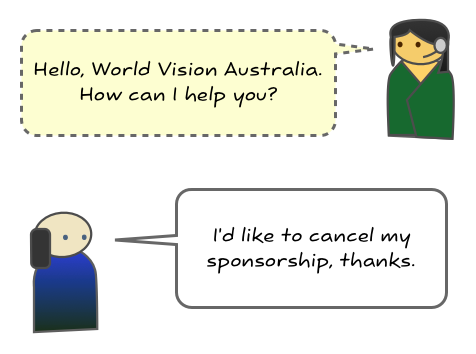

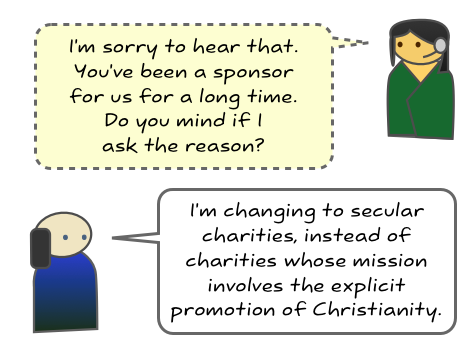









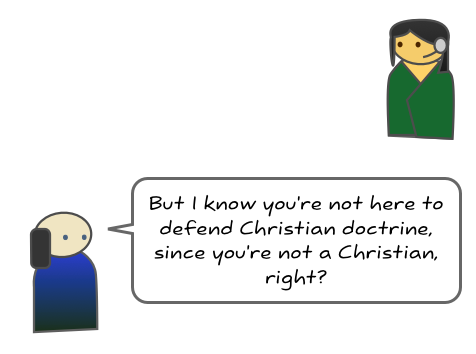




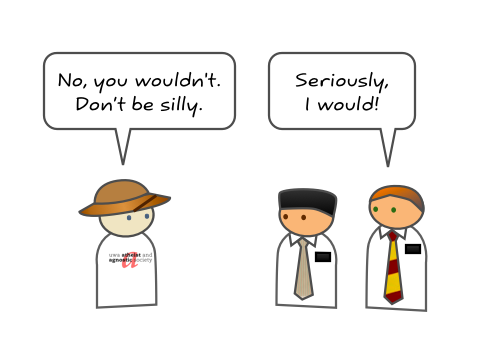

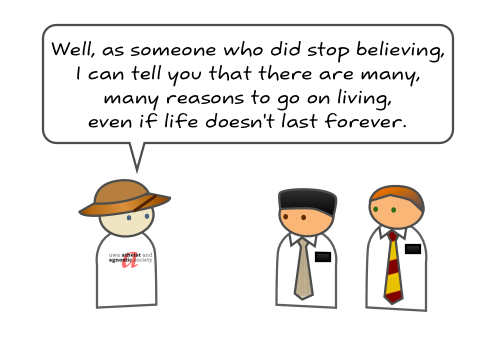


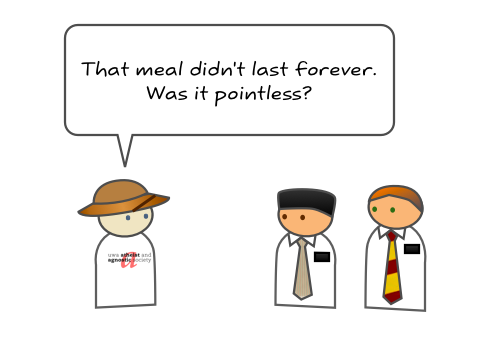

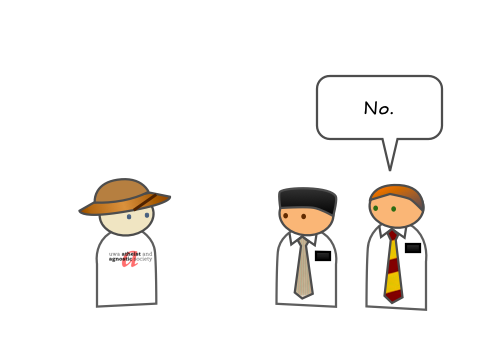


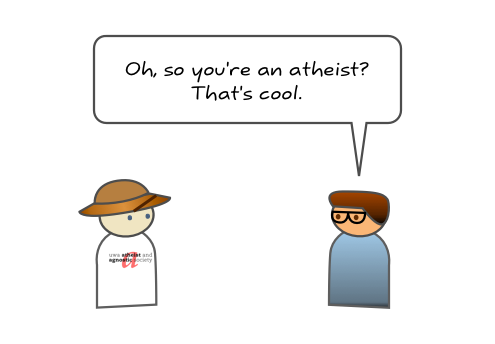

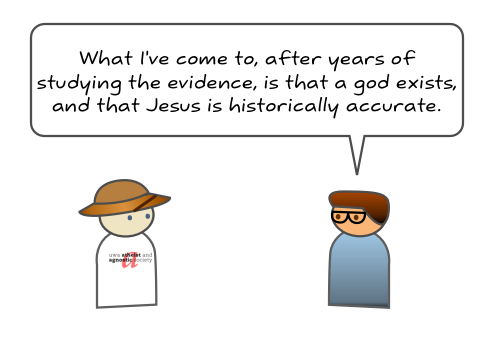



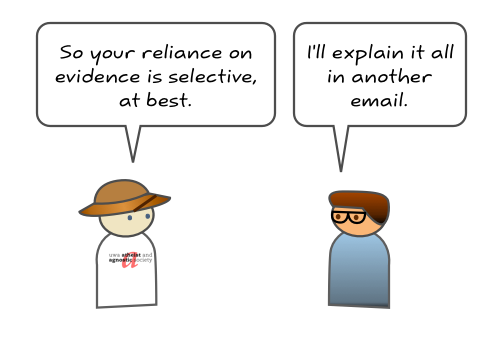

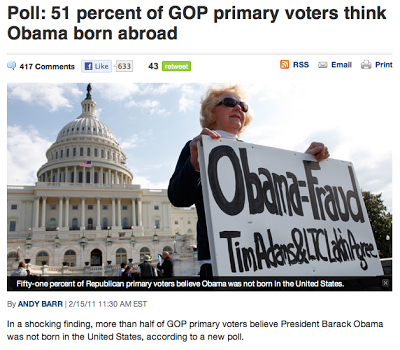


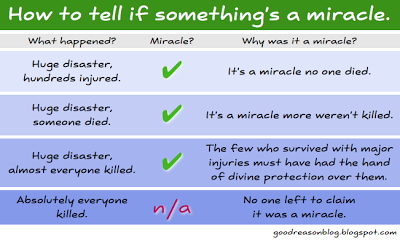

Recent Comments